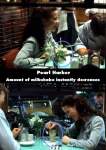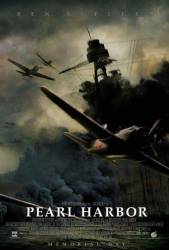Continuity mistake: Near the beginning when Rafe is in a train seat looking out the window at his girl, she is standing next to a stainless steel round end observation car with the name "Silver Horizon" in plain view. This car was built for the California Zephyr which didn't begin service until 1948. As Rafe's train begins to move, you can see the car's California Zephyr car number also.
Other mistake: Look a bit more closely at the scene in which the USS Oklahoma capsizes, as sailors are falling from the deck, etc. Despite the huge amount of dollars spent the battleship is very out of scale, especially the 14" main battery guns, which look suddenly like props in a high school play. Similar "cheap prop" shots abound in the film.
Continuity mistake: When the final planes take off from the aircraft carrier to bomb Tokyo, the captain gives the order for extra speed. But when the second and third planes take off, you can see that the carrier is safely moored with three anchor chains at the front of the ship and not going anywhere.
Visible crew/equipment: When the Captain is seeing the attack he ducks when the plane opens fire. In the next shot, when the two sailors say they just sunk the Arizona, at the top, left side you can see a man holding a camera, then it follows the two sailors.
Factual error: Towards the end of the film, when the United States launches an attack on the Japanese ammunition factories, the planes fly over Japan and show shots of geishas to establish the country. Japanese geisha communities were shut down by the Japanese government at the beginning of World War II.
Factual error: The spinning fan on the bomb wasn't the fuse itself - it was meant to arm the fuse, so that the bomb would detonate on impact. It needed to make only several spins to work. The bouncing bomb in the airfield scene should make a big hole, not bounce. It should also suffer some damage, while in the scene even the thin stabilizers are intact.
Factual error: One shot of the "Japanese fleet" at sea clearly shows a nuclear-powered super-carrier, surrounded by guided missile-armed cruisers and destroyers. (01:13:15)
Continuity mistake: After Doolittle's bombing raid on Tokyo and the planes are flying towards China, the sun is setting behind the planes. The planes are flying west, so they should be flying towards the setting sun.
Visible crew/equipment: When Rafe receives his medal if you look to the left of the screen you can see a camera.
Continuity mistake: When Rafe first meets his commander in England, the commander is standing next to a guy looking at a plane. The commander turns around and looks at Rafe, but in the following shot the other guy is now also looking at Rafe. (00:30:25)
Factual error: As Danny and Rafe prepare to depart for Florida to train for the Tokyo raid they board a DC-3 to take them to the mainland, with the nearest point 2,400 miles away. It would have been a wet trip: the DC-3 had a range of 1,600 miles. Military transport to the mainland in early 1942 would be by ship, " Clipper" seaplane or a stripped-down bomber.

Continuity mistake: In the scene when Danny and Evelyn are at the restaurant after they hear the news about Rafe's death, as the camera comes in on them from outside her milkshake is full to the point of overflowing but when they switch angles to show them from the inside the milkshake is half gone. (00:54:55)
Factual error: During the Air raid scramble of the RAF squadron, one pilot behind the RAF mechanic can be seen to be boarding a Hawker Hurricane, not a Spitfire. As far as I am aware, Hurricanes and Spitfires were never operated in mixed units. Squadrons had one or the other.
Suggested correction: While the RAF did not operate squadrons with mixed aircraft, different squadrons operating different aircraft did share the same air fields. So if the Hurricane mentioned has different squadron markings to the Spitfires then it can be seen as correct, if they are the same then it is wrong.
Whilst the planes on the ground are obviously hurricanes, those in the air are Spits both with RAF markings.
Continuity mistake: Close to the beginning when Rafe is in England and we hear sirens going off signifying they're going to attack, he runs over to his aircraft and shouts at a guy. If you look closely at his aircraft it says on the side RF T, yet in all other shots we see him in the aircraft marked RF M. (00:39:15)
Factual error: In one scene before the battle starts, a crew member is having his P-40 decorated with noseart. However, before late 1942, noseart wasn't allowed by the USAAF, unless you had a commander who really didn't mind. Lieutenant General Walter Short, who was in charge of the P-40's at Pearl Harbor, wasn't one of those commanders.
Continuity mistake: When Rafe is talking to Danny about going to Britain, Danny's position changes from being at the side of the truck to being at the front of the truck. (00:09:00)
Continuity mistake: In the scene where Rafe gets his medical check, he has problems reading. But in a later scene, he has no problem writing letters to Evelyn, and has no problem reading them.
Factual error: While Rafe is on the beach during the training to take off from an aircraft carrier, and burning some letters, mountains are noticed in the background while he is conversing with Danny. The actual location for this training took place on the historic "Doolittle Ramp" located at Hurlburt Field, Florida, near Eglin Air Force Base. The site is within 100 yards of the beach among numerous trees. There are no mountains (low hills maybe) in Florida .
Continuity mistake: In the scene after the attack on Pearl Harbor, Danny and Rafe get a message to go to see Colonel Doolittle, and the camera cuts to a taxi. The driver is standing inside the door of the taxi, but in the following shot of Rafe from inside the building, the driver is now standing with his arms crossed at the front of the car. (02:08:35)
Factual error: When the Japanese pilots are taking off the carrier deck, there is an overhead view of the launch. The carrier in the scene has a angled deck. The angle deck carriers didn't come along until after the war was over.





